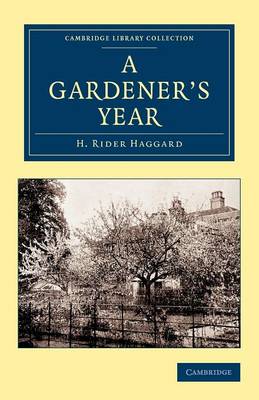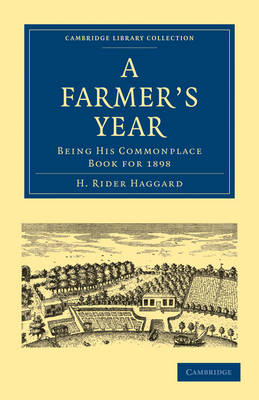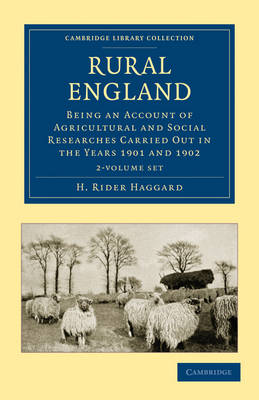Cambridge Library Collection - British and Irish History, 19th Century
2 primary works • 5 total works
Volume 1
H. Rider Haggard (1856-1925) is best known as the successful writer of adventure stories with exotic backgrounds such as King Solomon's Mines and She. However, he also served on a number of royal commissions, and in managing his wife's Norfolk estate became a recognised expert on agricultural matters. Rural England, published in 1902 and reissued in 1906, was the product of his travels around England and Wales writing articles for the Daily Express. They show a picture of agriculture in poor condition, and suggest reforms which would improve matters. The book was well received, and subsequently many of his suggestions were included in the Development Act of 1909. He favoured co-operative societies such as were found in Denmark, an increase in the number of smallholdings, and a national forestry commission. Volume 1 discusses conditions in a large part of the south and west of England, and the Channel Islands.
Volume 2
H. Rider Haggard (1856-1925) is best known as the successful writer of adventure stories with exotic backgrounds such as King Solomon's Mines and She. However, he also served on a number of royal commissions, and in managing his wife's Norfolk estate became a recognised expert on agricultural matters. Rural England, published in 1902 and reissued in 1906, was the product of his travels around England and Wales writing articles for the Daily Express. They show a picture of agriculture in poor condition, and suggest reforms which would improve matters. The book was well received, and subsequently many of his suggestions were included in the Development Act of 1909. He favoured co-operative societies such as were found in Denmark, an increase in the number of smallholdings, and a national forestry commission. Volume 2 examines the east of England and parts of the Midlands and Yorkshire.
H. Rider Haggard (1856–1925) is best known as the successful writer of adventure stories with exotic backgrounds such as King Solomon's Mines. However, he also served on a number of royal commissions, and in managing his wife's Norfolk estate became a recognised expert on agricultural matters. His A Farmer's Year (1898, also reissued in this series), recounts the work of the farm, together with observations on rural life and the state of agriculture in general. In 1905 he published this work, a diary of his garden in 1903. After an introductory chapter (with a plan) describing the the garden, orchard and glasshouses, and the staff he employed, the diary begins, relating the tasks and experiences of the year, from spraying against red spider mite in January to decorating the house with greenery on Christmas Eve. This beautifully written book reveals the horticultural taste and practice of the Edwardian era.
H. Rider Haggard (1856-1925) is best known as the successful writer of adventure stories with exotic backgrounds such as King Solomon's Mines and She. However, he also served on a number of royal commissions, and in managing his wife's Norfolk estate became a recognised expert on agricultural matters. A Farmer's Year is his diary for 1898, recounting the work of the farm, month by month, together with observations on rural life and the state of agriculture in general, which was suffering due to the population drift to the towns and competition from cheaper imported food. His descriptions of country life are beautifully written, with many illustrations: he clearly loves the land and is concerned for its future, but does not ignore the hardship faced by many farmers and their workers. The book is a fascinating mixture of anecdote and natural history, as well as depicting late Victorian agricultural methods.
H. Rider Haggard (1856-1925) is best known as the successful writer of adventure stories with exotic backgrounds such as King Solomon's Mines and She. However, he also served on a number of royal commissions, and in managing his wife's Norfolk estate became a recognised expert on agricultural matters. Rural England, published in 1902 and reissued in 1906, was the product of his travels around England and Wales writing articles for the Daily Express. They show a picture of agriculture in poor condition, and suggest reforms which would improve matters. The book was well received, and subsequently many of his suggestions were included in the Development Act of 1909. He favoured co-operative societies such as were found in Denmark, an increase in the number of smallholdings, and a national forestry commission.



